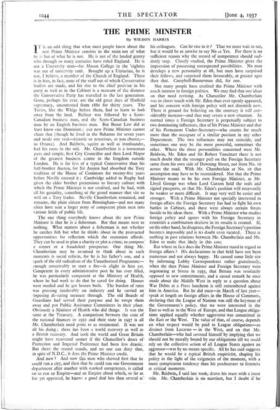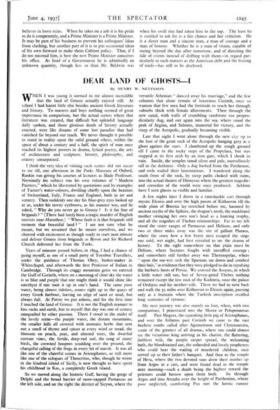THE PRIME MINISTER
By WILSON HARRIS IT is an odd thing that what most people know about the new Prime Minister consists in the main not of what he is but of what he is not. He is not of the landed gentry who through so many centuries have ruled England. He is not a University man—for Mason College in the 'eighties was not of university rank. Brought up a Unitarian, he is not, I believe, a member of the Church of England. There is in him, in fact, none of the stuff out of which Conservative' leaders are made, and his rise to the chief position in his party as well as in the Cabinet is a measure of the distance the Conservative Party has travelled in the last generation. Gone, perhaps for ever, are the old great days of Hatfield supremacy, uncontested from 1881 for thirty years. The Tories, like the Whigs before them, had to learn to look away from the land. Balfour was followed by a Scots- Canadian business man, and the Scots-Canadian business man by an English business man. But Bonar Law did at least know one Dominion ; our new Prime Minister cannot claim that (though he lived in the Bahamas for seven years and made one visit—historic or notorious, as you choose,— to Ottawa). And Baldwin, squire as well as ironfounder, had his roots in the soil. Mr. Chamberlain is a townsman pure and simple, first City Councillor and then Lord Mayor of the greatest business centre in the kingdom outside London. He is far less of a typical Conservative than his half-brother Austen, for Sir Austen had absorbed the Tory tradition of the House of Commons for twenty-five years before Neville entered it ; Cambridge added to Rugby had given the elder brother pretensions to literary culture with which the Prime Minister is not credited, and he had, with all his geniality, something of the grand manner that sits so well on a Tory leader. Neville Chamberlain remained, and remains, the plain citizen from Birmingham—and not many cities have sent a larger army of competent plain men into various fields of public life.
The one thing everybody knows about the new Prime Minister is that he is a fisherman. But that means next to • nothing. What matters about a fisherman is not whether he catches fish but what he thinks about in the protracted opportunities for reflection which the recreation affords. • They can be used to plan a charity or plot a crime, to compose: a sonnet or a fraudulent prospectus: One thing Mr. Chamberlain may be assumed to think about in such • moments is social reform, for he is his father's son, and a • spark of the old radicalism of the Unauthorised Programme-- enough conceivably to start a fire—is alight in him yet. Competent in every administrative post he has ever filled, he was particularly competent at the Ministry of Health, where he had work to do that he cared for doing. Houses were needed and he got houses built. The burden of rates was pressing intolerably on industry and he carried an' imposing de-rating measure through. The old Boards of Guardians had served their purpose and he swept them away and put Public Assistance Committees in their place. Obviously a Minister of Health who did things. It was the same at the Treasury. A comparison between the state of the national finances in 1932- and their state in 1937 is all Mr. Chamberlain need point to as testimonial. It was not all his doing ; there has been a world recovery as well as a British recovery. And both the world and Great Britain might have recovered sooner if the Chancellor's doses of Protection and Imperial Preference .had been less drastic. But there. the record stands, and no one can deny that, in spite of N.D.C., it does the Prime Minister credit.
And now ? And now this man who -showed first that he could run a..city, and then that he could run one Government department after another with marked competence, is called on to run an Empire—and an Empire about which, so far as has yet appeared, he knows a good deal less than several of his colleagues. Can he rise to it ? That we must wait to see, but it would be as unwise to say No as Yes. For there is no sufficient reason why the record of competence should sud- denly stop. Closely studied, the Prime Minister gives the impression of possessing unsuspected possibilities. No man develops a new personality at 68, but men have surprised their fellows, and surprised them favourably, at greater ages than that. Campbell-Bannerman did, for one.
Not many people have credited the Prime Minister with much interest in foreign politics. We may find that our ideas on that need revising. As Chancellor Mr. Chamberlain was in closer touch with Mr. Eden than ever openly appeared, and his concern with foreign policy will not diminish now.
There is ground for believing on the contrary it will con- siderably increase—and that may create a new situation. In normal times a Foreign Secretary is perpetually subject to two dominating influences, that of his Prime Minister and that of his Permanent Under-Secretary—who counts for much more than the occupant of a similar position in any other Department. The two influences may not coincide,' and sometimes one may be the more powerful, sometimes the other. Where the three personalities concerned were Mr. Baldwin, Mr. Eden and Sir Robert Vansittart there is not much doubt that the stronger pull on the Foreign Secretary came from his own side of Downing Street, not from No. to across the road. With Mr. Chamberlain at No. to that assumption may have to be reconsidered. Not that the Prime Minister means to be his own Foreign Minister, as Mr. Lloyd George was when Lord Curzon held the seals and . signed passports, or that Mr. Eden's position will necessarily be weaker or more difficult. It may very well be easier and stronger. With a Prime Minister not specially interested in foreign affairs the Foreign Secretary has had to fight his own battles in Cabinet, and there were always certain forces hostile to his ideas there. With a Prime Minister who studies foreign policy and agrees with his Foreign Secretary in essentials a combination. decisive in its results is created.. If, on the other hand, he disagrees, the Foreign Secretary's.position becomes impossible and is no doubt soon vacated.. There. is nothing in past relations between Mr. Chamberlain and Mr. Eden to make that likely in this case. .
But where in fact does the Prime Minister stand in regard to foreign affairs ? His declarations in that field have not been numerous and not always happy. He caused some 'little stir by infOrming Lobby Correspondents rather gratuitously, when the then Prime Minister and Foreign Secretary were negotiating at Stresa in 1935, that Britain was resolutely opposed to new commitments, and a casual remark he once made about the Middle West 'in reply to a question about War Debts at a Press luncheon is still remembered against him in America. But he did Once—in March of last year= speak at length on foreign affairs in the House -Of Commons, declaring that the League of Nations was still the keystone of ' the Government's policy, that we were interested in the East as well as in the West of Europe, and that League obliga- tions applied equally whether aggression was committed in the East or the West. The value Of that, of course, depends on what respect would be paid to League obligations=-as distinct from Locarno — in the West, and on that Mr. Chamberlain—who had covered himself by implying that we should not be morally bound by our obligations till we could rely on the collective action of all League States against an ' aggressor—was by no means specific. All he has said suggests that he would be a typical British empiricist, shaping his policy in the light of the exigencies of the moment, with .a more conspicuous tendency than his predecessor to firmness at critical moments.
Mr. Baldwintd said last week; drove -his team with a' loose rein. ,Mr,. Chamberlain is no- martinet, but I doubt if-he believes in loose reins. When he takes on a job it is his pride to do it competently, and a Prime Minister is a Prime Minister. It may be part of his business to prevent his colleagues' ideas from clashing, but another part of it is to put occasional ideas of his own forward to make them Cabinet policy. That, if I do not misread him, is how the new Prime Minister conceives his office. As head of a Government he is admittedly an unknown quantity, though less so than Mr. Baldwin was when his swift rise had taken him to the top. The least he is entitled to ask for is a fair chance and fair criticism. He is a direct man and a sincere man, a man of courage and a man of honour. Whether he is a man of vision, capable of seeing beyond the day after tomorrow, and of directing the tide of events instead of drifting with them—in regard par- ticularly to such matters as the American debt and the freeing of trade—has still to be disclosed.











































 Previous page
Previous page